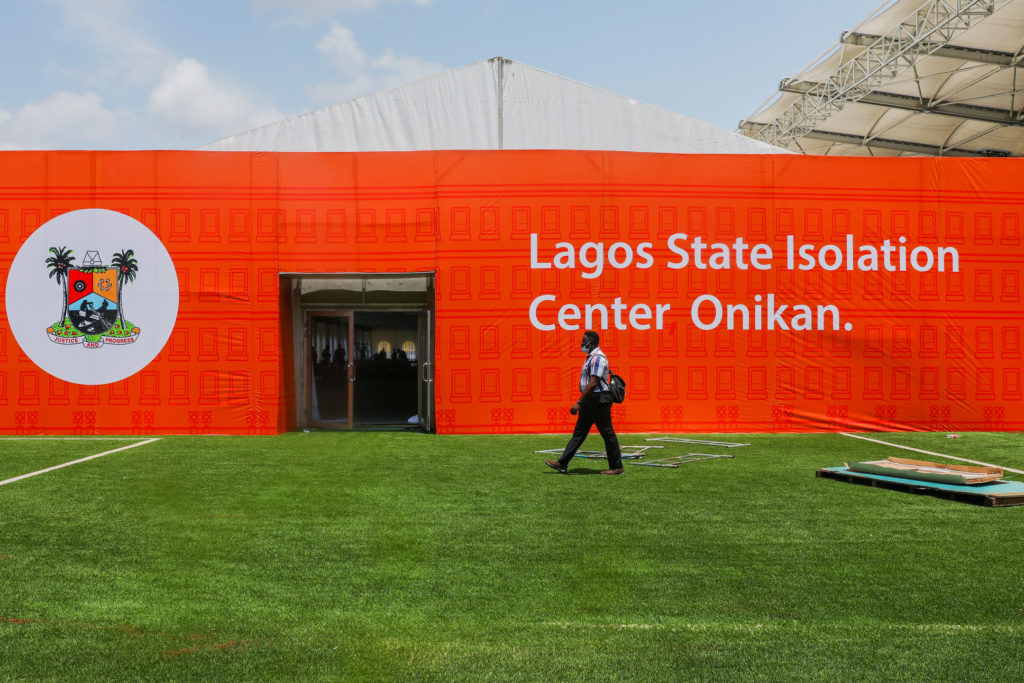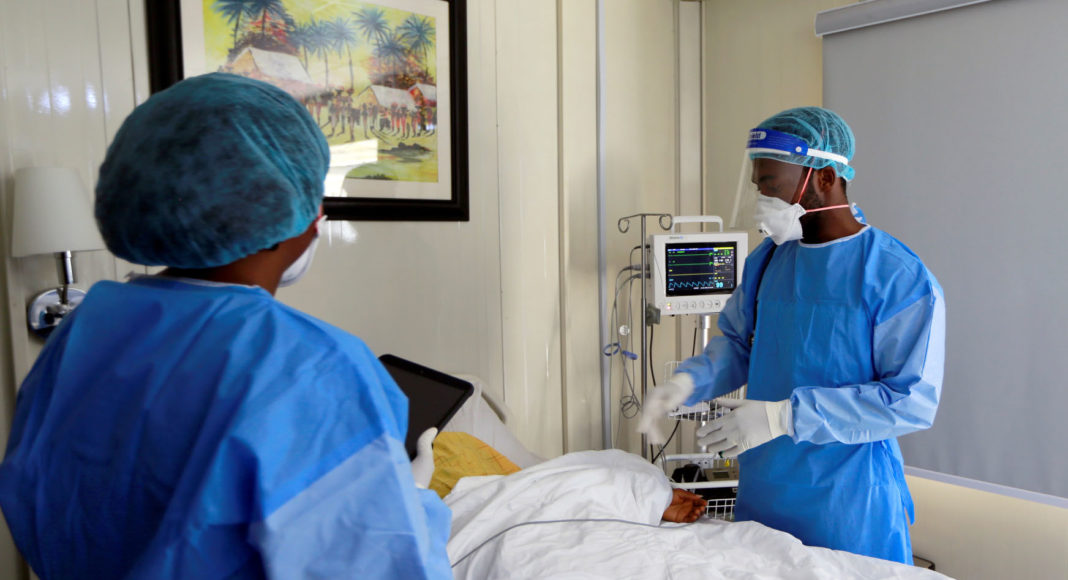By Kemi Falodun
When the first case of coronavirus was confirmed in Nigeria, health professionals across the country braced for the task ahead. Doctor Tope Ademola* was one of the 22 doctors who volunteered at the first isolation centre set up at Onikan Stadium. The Lagos state government lodged them in a hotel and transported them to and from the isolation center.
Dr. Ademola is an emergency physician at Onikan Health Centre, a small state government hospital on Lagos Island. At the gate of the hospital, I washed my hands and the security guard let me into the quiet compound. With his cheery wave, chatty voice and a mask strapped on his face, it was hard to sense a hint of fatigue on the doctor. But he was quite drained, he told me, having worked all morning and throughout the previous day. There was a time, though, that neither the mask nor his merry demeanor could conceal his exhaustion.
“In the beginning, the working conditions were good,” he said, recalling the early days of the pandemic in Nigeria. The government split the health workers into units and then, after a little while, someone in his group contracted the virus. The health worker was isolated at a place specifically set up for Lagos state staff working at Onikan Stadium, and his absence meant more working hours for the remaining four people in the group. “After a while, resources got scarce, we were rationing PPE and N95 masks,” Dr. Ademola explained. By mid-June, having worked for over three months, he felt his energy edging off and he sank into lethargy.
Burnout syndrome is a global phenomenon. It usually begins with chronic stress, characterized by loss of energy and enthusiasm for the future. This study on prevalence, impact and preventative strategies of burnout shows that “depersonalization and a sense of low personal accomplishment that leads to decreased effectiveness at work” are also some of the signs that a person is sinking. The mental health of medical practitioners is an issue of growing concern as it significantly contributes to the quality of care they are able to provide for their patients. The paper also reveals that “physicians in specialties at the front line of care access such as family medicine, general internal medicine, and emergency medicine seem to be at greatest risk.”
Due to numerous healthcare problems in Nigeria ranging from budget limitations and lack of adequate infrastructure to poor governance, many Nigerians working in the health sector have relocated to the US, UK and Canada. According to the Nigerian Medical Association, of the 75,000 doctors registered in the country, about 40,000 practice outside Nigeria.

“The major factor that contributes to burnout is shortage of manpower,” says Nurse Mabel Okeke*, who works in surgery at General Hospital, Marina. Her ward is big and she and her colleagues are required to move around frequently. She told me that if a partner she is supposed to have a shift with calls in sick, the probability that there will be a replacement is very low. “On those occasions, we find ourselves working alone,” she said.
Though she does not attend to Covid-19 patients, she said there has been an increase in the workload since the start of the pandemic because some people in her facility went to volunteer at the isolation center. “With or without pandemic, burnout is common among health workers, especially those working in federal hospitals,” Okeke explained.
Burnout happens in stages and it sometimes ends with the strain punishing one’s body. The first time Okeke was burnt out, she said it felt like her head was not on her body. She’d been working several shifts alone. She started feeling lightheaded, dizzy. People were talking to her and she could see their mouth moving, but could barely hear what they were saying. She was at a patient’s bedside, attending to her, when she fell. The patient called for help and she was taken to the emergency unit.
Last December was immensely busy for a lot of health workers, Dr. Ademola told me. Some doctors were away for various reasons so the ones available were short on hands, taking up more responsibilities. “You don’t realize you’re burnt out until you actually are,” he said, and he ended up spending a month recovering. “You are not as motivated as you used to be. You are a lot more irritable.” There was a time he snapped at a patient, and he knew that something was wrong.
In light of the pandemic, the mental health of health workers has been gaining more attention in the media. Centers for Diseases Control and Prevention published this article about how health practitioners can cope with stress and build resilience. Not much has been done, specifically in Nigeria, to proactively alleviate their situation. One study of health professionals during the Covid-19 outbreak published in the Journal of Diabetes & Metabolic Disorders concludes that “health care workers face aggravated psychological pressure and even mental illness.” The authors recommend that policymakers and managers should “adopt the supportive, encouragement & motivational, protective, and training & educational interventions, especially through information and communication platforms.”
Although burnout has been shown to be higher in physicians, with approximately one in three physicians experiencing burnout at any given time, the issue also occurs in all kinds of professions. Amanda Iheme, a psychotherapist and founder of NDỊDỊ, a private practice, attests to this. She has often attended to people in different careers who are burnt out, “especially during these past few months with the lockdown and Covid-19 pandemic.” As a mental health professional herself, she has also experienced burnout. “Last year was the worst in the past three years due to the increase in demand for mental health care,” she said.
“Once you are burnt out, you need to take a break,” Iheme added. “You will feel like there is so much to do and you cannot take a break because it will all fall apart, it won’t. A day off to focus on yourself and rest your mind will help the work be better,” she said. Okeke says recovering made her become a better nurse. After the episode, she learnt to pace herself and re-strategize better. She has since not experienced any serious issues.
“2020 was a terrible year for my personal relationships,” Dr. Ademola admitted. He could barely keep in touch with his friends and family. To help him and his colleagues get through the stress, Lagos State Government provided psychological intervention for health professionals. They organized virtual therapy sessions and followed up on individuals.
There are no easy solutions to health care issues in Nigeria, especially for mental health. To avoid burnout, Iheme recommends paying attention to one’s diet, exercise and sleep. “When taking a break, try to not focus on other responsibilities like family, our even household chores if you have the luxury to do so. Sometimes, we say we are taking a break but end up doing work outside of our professional jobs,” she said.
Though he’s not eager to leave Nigeria, Dr. Ademola is considering switching from clinical medicine to public health. “Medicine is not the problem. I love medicine. But clinical medicine is stressful.” Nurse Okeke shares other sentiments, asserting that the remuneration in Nigeria is insufficient for the amount of work they do. “We are poorly paid. The country is not working. No sector is spared, including the health sector. Basic equipment is not available and we have to improvise a lot of times,” she said.
She plans to relocate outside of Nigeria in the near future, and doesn’t blame others for feeling the same way. “I will not talk anyone interested out of it because I plan to leave too.”
*Names with asterisks have been changed to protect the identity of the person quoted.


